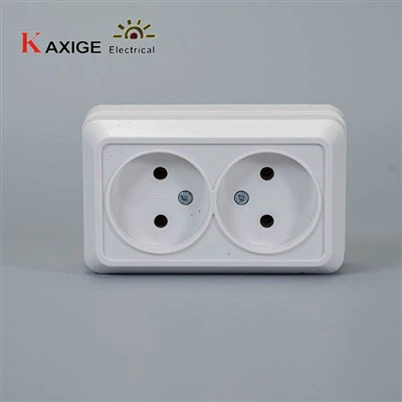Can white plastic sockets be recycled?
Leave a message
Can white plastic sockets be recycled? That's a question I've been getting a lot lately, and as a supplier of white plastic sockets, it's something I've thought about quite a bit. So, let's dive into this topic and see what we can find out.
First off, let's talk about what white plastic sockets are made of. Most of the time, these sockets are made from a type of plastic called polycarbonate or ABS (Acrylonitrile Butadiene Styrene). These plastics are known for their durability, heat resistance, and electrical insulation properties, which are super important for sockets.
Polycarbonate is a strong and transparent plastic that can withstand high temperatures without deforming. It's like the tough guy of the plastic world. ABS, on the other hand, is a bit more flexible and has good impact resistance. It's often used because it can be easily molded into different shapes, which is great for making all kinds of socket designs, like the 73B 1 Gang Switch with Lamp Indicator, the 73B Switch and Socket Combination, and the 73B 1 Gang Socket 2P.
Now, the big question: Can they be recycled? The short answer is yes, but it's not always that simple. Both polycarbonate and ABS are technically recyclable plastics. Recycling these plastics helps to reduce the amount of waste going to landfills and also cuts down on the need to produce new plastic from raw materials.
When it comes to recycling white plastic sockets, the first step is to separate them from other types of waste. This is usually done at a recycling facility. But here's the catch: Sockets aren't just made of plastic. They also have metal parts, like contacts and screws. These metal parts need to be removed before the plastic can be recycled. This separation process can be a bit tricky and sometimes requires specialized equipment.
Once the metal parts are removed, the plastic can be shredded into small pieces. These pieces are then cleaned to get rid of any dirt, grease, or other contaminants. After that, the plastic is melted down and reformed into new products. The quality of the recycled plastic might not be as good as the original, but it can still be used to make all sorts of things, like lower - grade plastic products or even new sockets in some cases.
However, there are some challenges in recycling white plastic sockets. One of the main issues is the lack of awareness. A lot of people don't know that these sockets can be recycled, so they just throw them away with their regular trash. Another problem is the cost. Recycling facilities need to invest in the right equipment to separate the metal and plastic parts, and this can be expensive. Also, the market for recycled plastic from sockets might not be as strong as for other types of recycled materials.
But there are also some positive things happening. More and more recycling facilities are starting to recognize the potential of recycling white plastic sockets. Some manufacturers are also taking steps to make their products more recyclable. For example, they're designing sockets in a way that makes it easier to separate the plastic from the metal parts.
As a supplier, I'm really interested in promoting the recycling of our white plastic sockets. I think it's important for the environment, and it also makes good business sense. By encouraging our customers to recycle, we can show that we care about sustainability. And who knows, maybe in the future, we'll be able to use more recycled plastic in our new products.
If you're a customer and you're wondering what you can do, it's actually pretty simple. First, don't just throw your old sockets away. Look for local recycling facilities that accept electronic waste or plastic products. You can also ask your municipality if they have a special collection program for these items.
Now, if you're in the market for high - quality white plastic sockets, we've got you covered. Our 73B 1 Gang Switch with Lamp Indicator, 73B Switch and Socket Combination, and 73B 1 Gang Socket 2P are all made with top - notch materials and are designed to last. We're always looking for new customers to work with, so if you're interested in purchasing our products, feel free to reach out and start a conversation. We can discuss your specific needs and find the best solutions for you.


In conclusion, white plastic sockets can be recycled, but there are some hurdles to overcome. With more awareness, better technology, and a growing market for recycled plastic, the future looks bright for socket recycling. Let's all do our part to make our planet a greener place, and at the same time, enjoy the benefits of high - quality white plastic sockets.
References
- "Plastics Recycling Handbook"
- Industry reports on electronic waste recycling
- Studies on the recyclability of polycarbonate and ABS plastics






